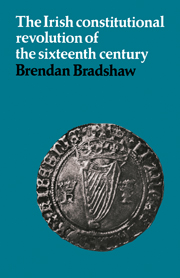Book contents
- Frontmatter
- Contents
- Dedication
- Preface
- Abbreviations
- Ireland about 1530
- PART I ‘A discourse of the cause of the evil state of Ireland and of the remedies thereof’
- 1 The medieval legacy
- 2 The Anglo-Irish movement for political reform
- 3 Henry VIII's Irish policy: Surrey's Irish expedition, 1520–2
- PART II The reform of the Lordship in the era of Thomas Cromwell, 1530–40
- PART III The liberal revolution
- Bibliography
- Index
3 - Henry VIII's Irish policy: Surrey's Irish expedition, 1520–2
Published online by Cambridge University Press: 07 October 2011
- Frontmatter
- Contents
- Dedication
- Preface
- Abbreviations
- Ireland about 1530
- PART I ‘A discourse of the cause of the evil state of Ireland and of the remedies thereof’
- 1 The medieval legacy
- 2 The Anglo-Irish movement for political reform
- 3 Henry VIII's Irish policy: Surrey's Irish expedition, 1520–2
- PART II The reform of the Lordship in the era of Thomas Cromwell, 1530–40
- PART III The liberal revolution
- Bibliography
- Index
Summary
Against the background outlined in the last chapter, of the ineffectualness of early Tudor government in Ireland, of the continuing consolidation of magnate power, and – in reaction to this situation, and under the influence of humanism – of a developing movement for reform, Henry VIII's first serious attempt to attend to the problems of his Irish Lordship must be considered. It originated in 1518–20, a period marked by a new though transitory zest on Henry's part for the role of active ruler. It was a period of grandiose schemes in external affairs, most of which came to nothing, the period of his candidature for the imperial crown and of Wolsey's for the papal tiara, the period of the plan for a crusade against the Turk, and of his first projection of a theological polemic. Side by side with these pretentious designs went an uncharacteristic interest in the practice of government. The king had lengthy memoranda prepared for the consideration of his council, outlining schemes for the reform of government, and envisaging a more active function for himself in the routine of administration. One of the few resulting projects to reach finalisation was the expedition of the earl of Surrey to Ireland in 1520.
Among the memoranda drawn up in 1519 was one setting the king and his council ‘to devise how Ireland may be reduced and restored to good order and obedience’. The decision was to send a military and administrative expedition, on the same lines as that sent by Henry VII in 1494–6 under Sir Edward Poynings. The earlier expedition had been largely ineffectual, but this one was to be more high-powered.
- Type
- Chapter
- Information
- Publisher: Cambridge University PressPrint publication year: 1979
- 1
- Cited by



